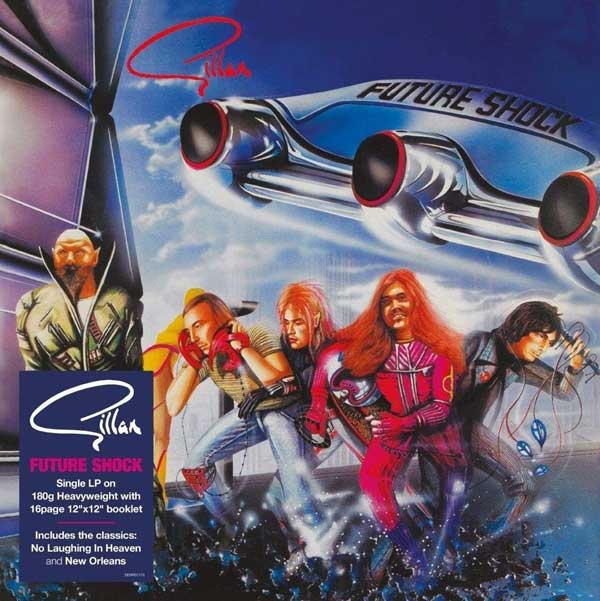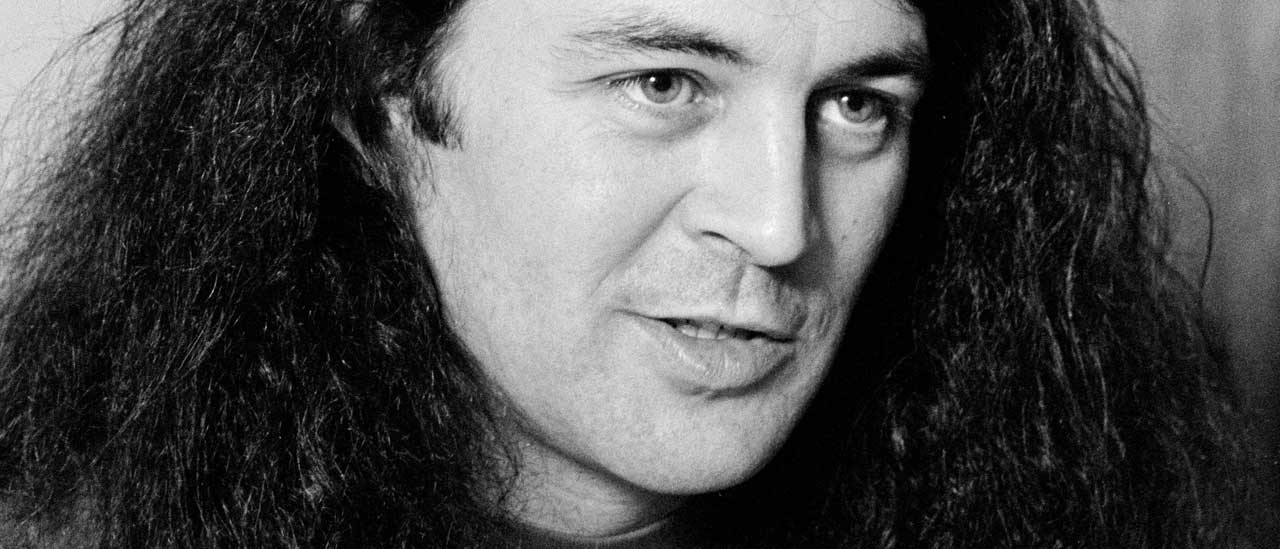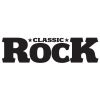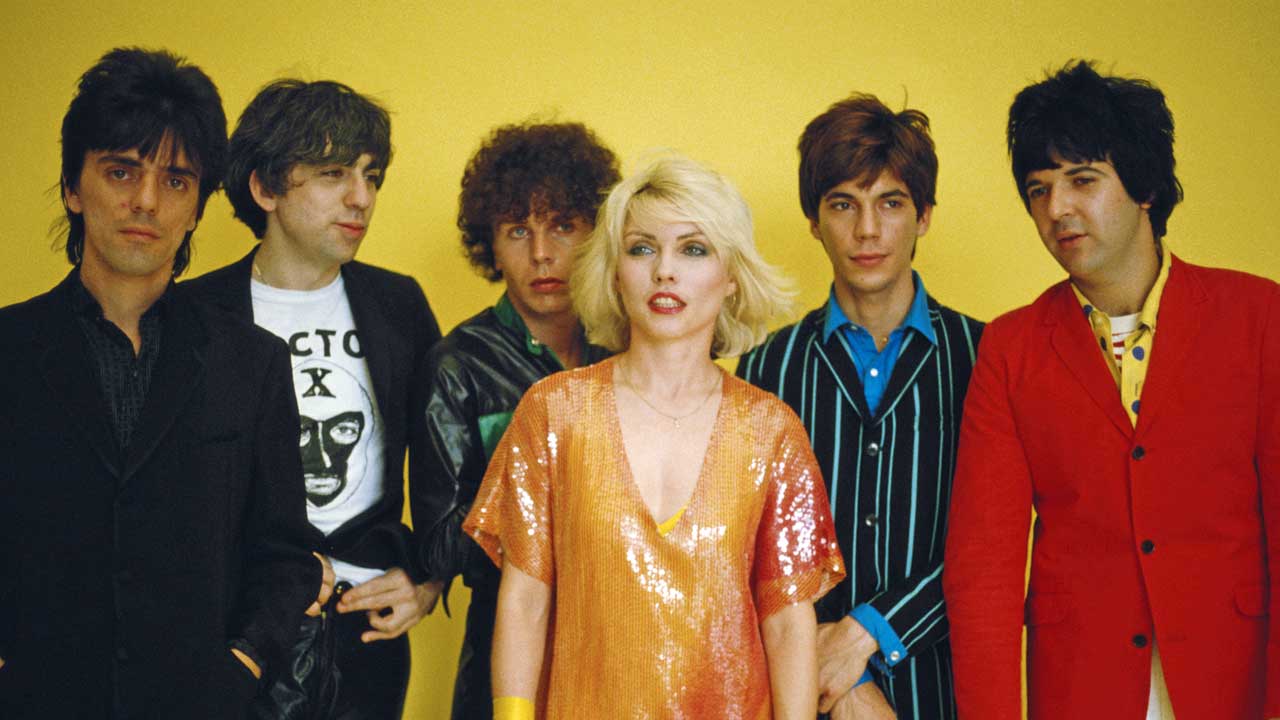You can trust Louder

Future Shock
Night Ride Out of Phoenix
(The Ballad Of) The Lucitania Express
No Laughing in Heaven
Sacre Bleu
New Orleans
If I Sing Softly
Don't Want the Truth
For Your Dreams
Fondly regarded in their day, mainly because of their proximity to the classic Mk II Deep Purple sound, it wasn’t until the release of Future Shock in 1981 that Gillan really came into their own. Preceded by the success of singles like the covers of Trouble and New Orleans, it also contained some of the best material vocalist Ian Gillan had leant his name to since his Purple heyday, not least the witty No Laughing In Heaven.
"It was really the start of me being publicly irreverent," Gillan told us. "It harked back to when I was 13 years old, asking questions at Sunday school like, ‘Father, what was the immaculate conception?’, and getting answers like, ‘You have to have faith in God, my son. Faith will guide you’.
"And I began to realise that I didn’t believe in religion, and that God didn’t create Man, it was the other way round. The idea of going to heaven was anathema to me. The last thing I want to do is be stuck in heaven with the sort of people I’d like to avoid! That’s where this song comes from."
When the band fell part in 1982, as Ian Gillan readied himself for his return to the US stage with Black Sabbath – and a year after that, with the reunited Deep Purple – there was a genuine sense of loss in the rock community.

Every week, Album of the Week Club listens to and discusses the album in question, votes on how good it is, and publishes our findings, with the aim of giving people reliable reviews and the wider rock community the chance to contribute.
Other albums released in April 1981
- Modern Times - Jefferson Starship
- Fun in Space - Roger Taylor
- Prayers on Fire - The Birthday Party
- Faith - The Cure
- Come an' Get It - Whitesnake
- The Flowers of Romance - Public Image Ltd.
- Don't Say No - Billy Squier
- Of Skins and Heart - The Church
- Go for It - Stiff Little Fingers
- Hit and Run - Girlschool
- Twangin... - Dave Edmunds
- Fair Warning - Van Halen
- Bad For Good - Jim Steinman
- Dedication - Gary U.S. Bonds
- The Nightcomers - Holocaust
- Punks Not Dead - The Exploited
- Spellbound - Tygers of Pan Tang
- Waiata - Split Enz
- The Completion Backwards Principle - The Tubes
- Zebop! - Santana
What they said...
"Future Shock is a fun and solid album. What makes it not like contemporary metal bands is the outstanding keyboard performances (organ/synthesizer/piano) by Colin Towns. He’s not the kind to play atmospherics and rhythm only and gets a noticeable share of solo time. He is a fantastic player, though sometimes the keyboard sound does wet down the metal feel of Bernie Torme’s guitar." (Metal Music Archives)
"The Lucitania Express will have you shouting out the chorus and the hit (yes, they were on Top of the Pops) single No Laughing In Heaven will give you a smirk with its lyrics and pseudo-rap. There’s not a weak point anywhere with everything top-notch. It’s heavy, melodic, well crafted and never bettered by anything Gillan did with this band or any other." (New Wave of British Heavy Metal Blog)
"There are a handful of classics on Future Shock, mixed with some mediocre fillers - but a hard rock fan should have this album, even if it was just for the three minutes of The Ballad Of The Lucitania Express, which is the Perfect Heavy Fast Rock song. This song steams like the overheated locomotive that it is about, is not a second too long and has everything perfectly in place." (AllMusic)
What you said...
Mark Herrington: Future Shock is a mixed bag of an album. I remember hearing this back in 1981, but invested in Moving Pictures and Mob Rules instead, both released the same year.
Some good songs, and also a few not so good. Some great vocals, and also moments when Gillan clearly strains a bit. It seems a long way from his awesome 70’s albums with Deep Purple.
I like the cover New Orleans, where the vocals are great, but Sacre Bleu falls short. This is the same throughout: some good work, and some ordinary. The guitar work throughout is consistently good. The album artwork is awful. Where’s Roger Dean when you need him?
Overall, a fairly average rock album with a few highlights.
Chris Elliott: Without the Gillan name they'd have never been more than a long-forgotten support act. The singles were awful (Laughing In Heaven sounds like the vocals were phoned in). The album is better but it's hardly memorable. The random trademark Gillan screams are just irritating (it's like you're known for screaming so just scream every minute or so) - the keyboards sound like karaoke Jon Lord and it's just so mundane.
At 15 I didn't rate it enough to tape it, and my tolerance has declined since then. It's not awful, but it's utterly forgettable.
Mike Canoe: Future Shock strikes me as a Deep Purple album in all but name. Of course, there's the mighty Ian Gillan on vocals but the rest of the band pays tribute to the Mach II lineup as well. Keyboardist Colin Towns channels the overpowered organ sound of Jon Lord, Bernie Tormé supplies plenty of guitar heroics and flash, and the rhythm section does Paice and Glover proud. The main difference between Future Shock and a Deep Purple record is the trimming of self-indulgent and meandering solos. A fun and entertaining album that rocks out with the best of them.
Adam Ranger: I listened to this and the first two Gillan albums a lot as a young teen when they came out. Ian Gillan was a legend to us early NWOBHM-loving teenagers. His stuff with Purple rarely off our playing rotation.
Hearing this again after so long, it's still good, but perhaps dated. (Deep Purple are dated, of course, but carry the classic rock mantle well). Now. I can't help feeling this was a period where Gillan harked back to Purple days. But with less indulgent screams, guitar workouts or organ solos. It works up to a point. I feel Gillan is a band rather than one name, but some of the songs now seem pedestrian or uninspired.
I like No Laughing In Heaven, which tells the story in spoken word for lots of it. It's tongue-in-cheek and fun. There are some good rocking tracks and some OK 80s-sounding stuff. I'll have to listen to the first two Gillqn albums now - I remember liking them more back in the day.
A solid but not exceptional album.
Dale Munday: I recently became reacquainted with this album via the recent Gillan box set 1978 -1982, having long since sold my records. For me, it's the last of the really great Gillan albums.
The two subsequent albums, with Janick Gers, although good, never quite reached the peaks achieved with those three albums. I was fortunate enough to see the band live a couple of times and they were great fun. They appeared to be having as good a time as the audience, which makes the acrimonious split difficult to comprehend.
Gary Claydon: Reviewing Future Shock for Sounds back in 1981, Geoff Barton was effusive in his praise, having no hesitation in awarding the album a full five stars. Barton called Future Shock "heavy metal for the '80s". The main thrust of his comment was that Heavy metal was one of the more conservative genres, not prone to being overly progressive in nature. He stopped short of calling Future Shock an actual step forward, terming it a "big step sideways" or words to that effect.
At the time, you kinda knew what he meant. Barton was wrong of course. '80s metal would turn to speed; faster and heavier was the order of the day in some quarters (which was good) though, ultimately, the decade would come to be dominated by and chiefly remembered as an era of MTV-driven style over substance (which was largely bad).
Indeed, it was also a decade when we were no longer allowed to refer to bands such as Gillan as being heavy metal anymore, lest some genre-fixated fuckwit jump down your throat in three seconds flat screaming " THEY'VE NEVER BEEN HEAVY METAL", a practice that became even more prevalent with the advent of the Internet. The irony is, Future Shock's 'grown-up' hard rock kicks the shit out of plenty of stuff that masqueraded as metal in the '80s.
So, groundbreaking Future Shock might not have been, but it is a very good album which still stands up 40-odd years later. Which is no surprise, given that this was a fine band at the top of their game. Eschewing metal's more common lyrical content of the 'sex and drugs and fast cars' type, the songwriting is strong, with plenty of humour and a degree of social awareness. The playing is tight and, propelled by the excellent rhythm section of McCoy and Underwood, the album proceeds at a decent enough lick; even the slower numbers aren't lacking in punch.
One of the album's strong points is the interplay between Colin Towns' 'classic rock" keyboards and the razor-sharp guitar of the brilliant Bernie Torme, whose fuzzed-up, dive-bombing style keeps even bonafide heavy-rock royalty such as band leader Gillan very much on his toes. The overall result is punchy and melodic.
The opening title track sets the tone nicely and there is nothing you could genuinely call filler. Sure, the spoken-word vocal of No Laughing In Heaven isn't entirely convincing, nor is the faux-French of Sacre Bleu, but both are still decent enough tracks. (The Ballad Of) The Lucitania Express thunders along like the locomotive of its title and there is a rollicking take on New Orleans. Further highlights are If I Sing Softly', Bite The Bullet and For Your Dreams. All in all, Future Shock is a highly enjoyable romp.
As a footnote, the line-up of Gillan, Torme, Towns, McCoy and Underwood were a superb live band that had a real on-stage chemistry.
John Davidson: The New Wave of British Heavy Metal brought us Diamond Head, Iron Maiden and Def Leppard, but it also gave older acts a new lease of life. Rainbow and Black Sabbath found themselves bothering the charts and ousted singers like Ozzy and Ian Gillan found a new audience that wanted a whiff of nostalgia and a touch of the new.
After a tentative re-acquaintance with bluesy hard rock on Mr Universe, Gillan went on to greater success on Glory Road and even more so on Future Shock - where two top 40 singles landed him on top of the pops for the first time since Black Night during his Deep Purple days.
Listening to Future Shock now it is probably the strongest of the three albums recorded with the classic lineup of Torme, McCoy, Underwood and Towns, though there are plenty of decent tracks on the other two as well.
It's a fair criticism to say that this is meat-and-potatoes heavy rock and it's not breaking any new ground, though it is elevated by Bernie Torme's guitar playing and embellished by Gillan's classic vocals.
Night Ride Out Of Phoenix and the ballad If I Sing Softly are perhaps the standout tracks but there are no clunkers. The cover of "New Orleans has plenty of pep and the jokey No Laughing In Heaven is as relevant today as it was when it was made - poking fun at po-faced evangelical/Presbyterian attitudes towards good-time rock'n'roll. A solid 8/10 from me.
Greg Schwepe: I normally don’t read the reviews each week until mine is done and posted, lest I be swayed in my opinion. But for some reason, this week I peeked. And interesting, it seemed most of the reviews so far were from our group members in the UK. And it appears many were owners and fans of this very album, aware of Gillan’s solo output, or have actually seen Gillan.
Now, contrast that to my experience here in the great rock'n'roll heartland we call the Midwest U.S. Here, even though rock and hard rock is king, the "less than average music fan" knows only three Deep Purple songs (because that’s all the FM radio stations play!), and wouldn’t know who Ian Gillan was if he smacked them in the face. And if they owned this or any other Gillan albums, they certainly didn’t hear it on the radio first (remember, it’s the same FM stations!), and probably bought at a used record store because it wouldn’t have been stocked new.
And why did I just go on for two paragraphs about all this? For one, I find it interesting how our geography sometimes influences what bands we heard and found out about. And two…this is a nice little kick-ass rock record that I would’ve certainly bought back in the day had I known about it!
And after I heard Bernie Torme’s opening riff on the title track, I knew I was here for the entirety of this album. And when the vocals kick in, it’s that distinctive Gillan wail.
Not surprisingly, the album is full of keyboards, and No Laughing In Heaven probably comes the closest to sounding like Purple with the organ. Hey, why not?
The raucous New Orleans jumps out with some call and response with Torme’s slide guitar. And then some honky tonk piano.
Probably my favourite song is If I Sing Softly. That one could be called the epic ballad of the album. As I was listening I definitely got caught up in it.
I was always one to buy the solo albums or little side projects of artists I like. Had I been a huge Deep Purple fan, I could totally have seen myself buying this back in the day; probably finding that used copy! 7 out 10 for me on this one.
Evan Balfour: Loved this album when it came out, still do. Great artwork as well.
Simon Chapman: Ooh, this is a good one! Holds up really well, still sounds great. My personal favorite Gillan album is still Mr. Universe but Future Shock is probably the best of the rest.
Tony Wheeler: Great album. My first Gillan gig was Double Trouble what a great bunch of albums. Then the Purps came calling and it was all over. Feck it.
Nigel Taylor: One thing I have never understood is how the Gillan band albums have been so forgotten. Every single one of them is brilliant, but the likes of Future Shock and Mr Universe are superb.
Firstly, you can't talk about this album without mentioning the late/great Bernie Tormé. There really aren't that many guitarists out there that have just such a recognisable guitar tone like Bernie did, and his playing and solos are just brilliant. The rest of the band were no slouches either and Mr Gillan himself excelled on this album both vocally and lyrically. I mean, No Laughing In Heaven has to contain one set of the best lyrics ever written. 'No party? No Party?! Let me Out!!!'
There is a real depth to the material on here as well. (The Ballad of) The Lucitania Express has a real punky aggression to it, If I Sing Softly is a superb ballad, Sacre Bleu is some tongue-in-cheek fun, Future Shock itself is a driving rocker, and like it or lump it the previously mentioned No Laughing in Heaven has to be one of the first Rap/Rock crossovers.
As a kid growing up the Gillan band helped shape my love of music and the cassette of Future Shock was one of those albums that blew me away at the time and still does to this day, just gutting I was never old enough to see them before they imploded.
Hylton Blignaut: Great album. Such a pity Gillan just walked out on that band without so much as a "goodbye". Idiot.
Paul Jenkins: My favourite Gillan album. The title track, Bite The Bullet, No Laughing In Heaven, Night Ride Out Of Phoenix and If I Sing Softly show the depth and diversity of the band's sound. Whilst Mr Universe and Glory Road are slightly better albums, this album is special for me as it was how I got into their music to begin with.
Philip Qvist: I think Future Shock is a good, solid album, but I'm not too sure if it is a great one. It does sound like a record of its time, and it is a bit dated, and I can't say the cover grabs my attention - but hey; it rocks and it does get the job done.
There is no doubt that Ian Gillan is the boss here, but he is well supported by a great team of musicians, especially guitarist Bernie Torme. Best songs are No Laughing In Heaven, Bite The Bullet and Night Ride Out Of Phoenix.
Gillan are one of those late 70s bands that rarely get a mention these days, so I'm glad that we have got to review one of their albums this week. Future Shock may be good, enjoyable album, but it won't fit into my list of must-have albums. That all said, it will still get a decent score from me this week.
Peter Robinson: Gillan was my first ever gig, aged 16 at the Marquee in Wardour Street 1978 and the albums and gigs of Gillan, Whitesnake and Rainbow were the soundtrack of my life for the next few years. I remember looking forward to the release of all these albums and still listen to them now!
Steve Pereira: My first experience of Gillan, and I found the band to be acceptable rather than exciting or interesting. Future Shock is by and large the band's most popular and most acclaimed album, and contains the single No Laughing in Heaven which found the band appearing in mime (badly) on the BBC show Top Of The Pops.
The band are tight and accomplished, and can play fast or slow, moody or raw, as the moment demands, but rarely do they feel engaged or emotionally involved. The band feels like a bunch of experienced session musicians, including Ian Gillan himself. He launches into his trademark - Arthur Brown-inspired - screaming and shrieking with admirable professionalism but a curious lack of emotion, giving the same lack of genuine feeling as he did when knocking off the vocals for the Jesus Christ Superstar musical.
Indeed, much of his vocal performance on the album has the melodic tone of theatrical singing rather than raw rock. While the band do drift close at times to sounding like Deep Purple, especially in the rhythm section of Underwood and McCoy, the keyboards by Colin Towns, despite echoing the high tones of Jon Lord's organ, tend to be rather ornate, while the clearly talented Torme on guitar has the speed and the riffs, but not the gutsy rawness of Blackmore.
Ultimately the band sound like a tribute to Deep Purple. It feels like Gillan, after experimenting with jazz fusion with the Ian Gillan Band, wanted to get back to the raw excitement of Purple, and is perhaps trying too hard to be Purple rather than just letting loose and enjoying himself.
Given the clear talent and ability in the band, they could easily have pulled it off, except the material lets them down. There's some OK songs on here. The Lucitania Express, a pedal to the metal drive over the edge, could have appeared on any Purple album, while No Laughing in Heaven has some of the romp and rock humour of The Sensational Alex Harvey Band, but, on the whole, the album pulls up short.
All in all an acceptable album, but there's little here that excites or is going to draw me back for repeat listens.
Final score: 7.56 (59 votes cast, total score 446)
Join the Album Of The Week Club on Facebook to join in. The history of rock, one album at a time.
Classic Rock is the online home of the world's best rock'n'roll magazine. We bring you breaking news, exclusive interviews and behind-the-scenes features, as well as unrivalled access to the biggest names in rock music; from Led Zeppelin to Deep Purple, Guns N’ Roses to the Rolling Stones, AC/DC to the Sex Pistols, and everything in between. Our expert writers bring you the very best on established and emerging bands plus everything you need to know about the mightiest new music releases.



